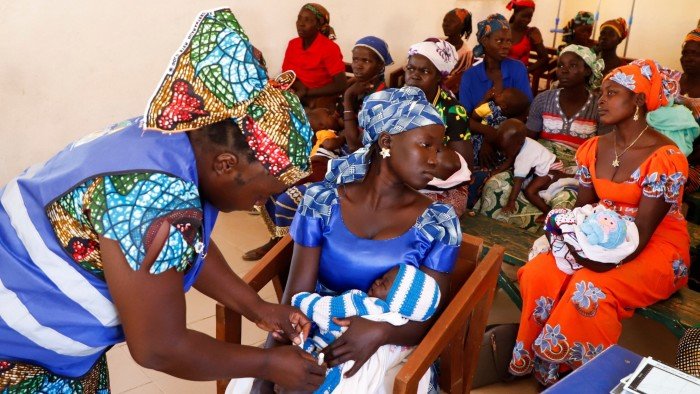Unlock the Editor’s Digest for free
Roula Khalaf, Editor of the FT, selects her favourite stories in this weekly newsletter.
There are few more cost-effective ways of saving lives than mass vaccinations. But cuts to aid funding by the US, Britain and others could jeopardise decades of progress in protecting against, and eliminating, key infectious diseases. The Trump administration’s proposed coming-year budget contains no funding for the Global Fund to Fight Aids, Tuberculosis and Malaria, or for Gavi, the international vaccine alliance to which the Biden White House had promised $1.6bn over the next five years. The UK, cutting overseas aid to raise defence spending, will soon reveal its next pledge to Gavi. A donor summit for Gavi on Wednesday will be a vital test of how, and whether, global public health efforts can function in a bleaker aid funding climate.
Increased suspicion of vaccines especially since the Covid pandemic, culminating in vaccine sceptic Robert F Kennedy Jr’s appointment as US health secretary, is already eroding immunisation efforts in developed countries. The impact of waning immunisation in lower-income countries could be even graver. From its creation until 2023, for example, Gavi helped to vaccinate more than 1.1bn children in 78 countries, averting at least an estimated 18.8mn future deaths.
Allowing even part of the successes of such efforts — or other health initiatives such as the campaign against malaria — to be reversed would not only be unjust. It would also be profoundly short-sighted. Public health improvements help to drive economic development that increases domestic stability and boosts global trade.
Infectious diseases do not respect borders. Measles or polio can rapidly spread in pools of unprotected children and adults, then jump across to developed countries that are themselves more vulnerable due to vaccine scepticism. The US is grappling with multiple measles outbreaks, each originating in a case in an international traveller. Gavi has also built up stockpiles of emergency vaccinations against killer diseases such as Ebola.
Critics argue some aid projects have proven wasteful. But multilateral health programmes can deliver a lot of bang for the buck. One authoritative study found the return on every $1 spent on immunisation programmes against 10 diseases for 94 poorer countries in 2011-20 was $26 in saved costs of illness, and $51 using “value of a statistical life” methodology.
Gavi’s “replenishment” summit will be a barometer for the future. The at least $9bn donor funding it seeks for 2026-30 — with countries it supports contributing a further $4bn towards their vaccine costs over the period — is intended to fund immunisations for 500mn more children. Britain has in the past been its biggest sovereign donor, but the Labour government has reduced aid spending from 0.5 to 0.3 per cent of gross national income. Prioritising multilateral programmes would help maximise the impact of what remains.
Losing US support, which previously accounted for about 13 per cent of Gavi’s budget, could result in 75mn children missing routine vaccinations in the next five years, and more than a million preventable future deaths, the vaccine alliance estimates. Congress ought to ensure the Biden-era pledge for coming years is honoured; it, not the White House, is responsible for budget decisions, and global health initiatives have historically enjoyed bipartisan backing.
Gavi has non-government donors such as the Gates Foundation, development banks, and private-sector partners but will have to do more to diversify its sources if US and UK funding wanes. The EU, some European countries and Canada have signalled they are ready to maintain or increase their contributions. Indonesia, formerly a Gavi-supported country, is becoming a donor, joining 18 others that have “graduated” from support once their national income hit a benchmark. Just as US allies are having to spend more on their militaries, other countries may need to step up to maintain global defences against a different category of threats.


